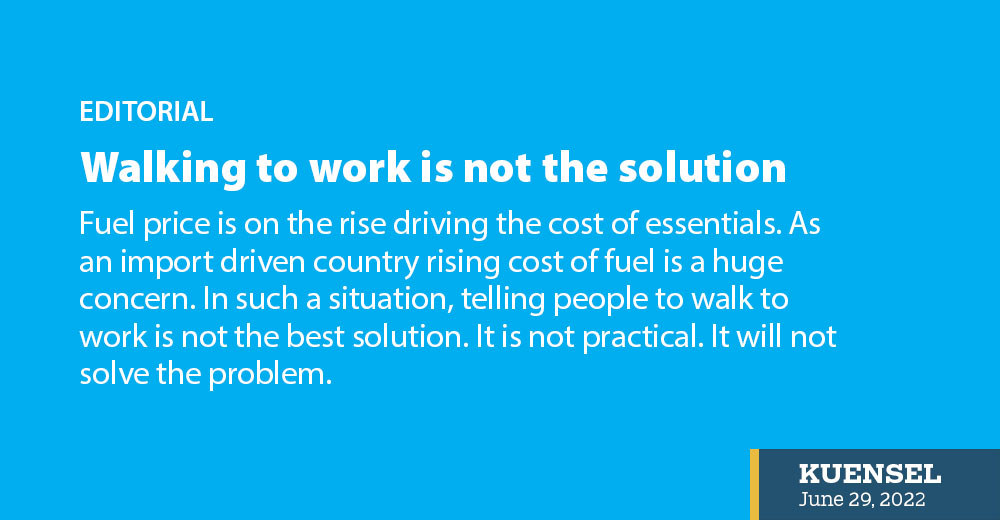Fuel price is on the rise driving the cost of essentials. As an import driven country rising cost of fuel is a huge concern. In such a situation, telling people to walk to work is not the best solution. It is not practical. It will not solve the problem.
What can solve the problem is good policies and decisions. Shortage or the rising cost of fuel is a global problem. In our region some governments are cuttinf down on the sale of fuel for non-essential vehicles. People are being told to stay home, work from home, or to make use of public transport services. We are in a better situation. The government has enough money to import fossil fuel as long as there is supply. People still prefer to drive notwithstanding the surge in fuel price.
At the same time, this is happening because we do not have a reliable and efficient public transport system. The capital city is seeing an increased number of city buses. However, it is not enough. A ban on sale of fuel to non-essential vehicles – thousands of cars we drive to work every day – spells trouble. The city buses will not be able to transport all the people on time for work and back home. Beyond the capital city, transportation would come to a standstill because there is no public transport.
The current fuel crisis should not go into waste. We need to look for alternatives.
Electric vehicle is one. There is already a movement, small it may be, towards going electric. If there are policies that encourage people to buy electric vehicles or schemes that are affordable, many would want to go electric. A private company promoting E-vehicles in Thimphu recently had all EV vehicles booked. A bank is providing 70 percent of the cost in loan. This enables people to buy EVs even if they cost thrice the price of an fossil fuel-driven vehicle. Many are convinced that it is the way forward even if they are not concerned about the carbon footprint fossil fuel-driven vehicles leave behind.
The government should come with schemes and policies that will make people switch to EVs. Dependence on imported fossil fuel that costs more than the electricity we export should convince the government. Without alternatives, we will keep importing cars that will burden the government exchequer.
Public transport is the other alternative. For decades we have been talking about it without any results. Successive governments have promised improved public transport that is reliable and affordable. None kept their word.
An electric tram between Khasadrapchu and Dechencholing could, for example, remove more than a thousand cars from our roads. There are no separate bus lanes in the capital city after years of discussion on public transport. Meanwhile, more than a thousand vehicles are added to our roads every month.
The impact of fuel shortage is already being, to the bones, as some say. In some dzongkhags, farmers have to get a clearance from the gewog office to buy diesel for their power tillers. The decision may be to stop hoarding, but when a farmer has to leave his power tiller in the field, go home to wear his gho and pick up a kabney and head to the gup’s office for the “letter of proof”, it costs him time and money. If the gup is in the meeting or on a tour, the changla has to be postponed.


